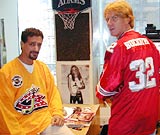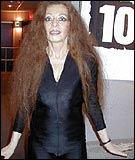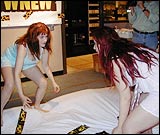
What’s going on with the amputee girl?” Anthony Cumia demands during a break in “The Opie and Anthony Show.” But neither partner Gregg “Opie” Hughes, nor producer Ben Sparks, nor any of a handful of twentysomething interns and assistants has any idea what’s happened to the woman who promised to come in and show off her prosthetic foot.
“The last time I spoke to her, she was leaving work,” offers a producer the guys call Stinky. “She said she’d be here at five.”
Cumia sips a bottle of Budweiser and shakes his head wearily. As he and Hughes face each other across the width of a peninsula-shaped console of switches and dials (at the end of which someone’s carved I LOVE ANTHONY), producers run in and out of the cramped studio waving notes in front of their faces. There’s a half-hour left on today’s show, they’ve already played bingo with callers’ bra sizes, and one of the contestants for the planned “Blind Boxing” bout has canceled.

Facing the threat of some outrage-free airtime, Cumia and Hughes grudgingly allow a time-ravaged stripper named Sandy Kane into the studio to perform a raunchy ballad. They’re forced to bleep out several forbidden phrases, and Hughes warns, “We’re gonna let you try it one more time, but if we have to dump out again, we’re all going to throw stuff at you.” When she makes it through the number, a twisted love song for Jerry Seinfeld, Hughes shrugs: “Let’s throw stuff at her anyway.” Kane freezes before the mike as all five guys in the studio begin hurling audiocassettes, half-filled bottles of water, and copies of Black Tail magazine at the wall just past her head. Sparks is frantically picking up after his bosses, as an overstimulated Hughes lifts his office chair over his head and smashes it to the floor. Red-faced and sweaty, with ten minutes to go, Hughes and Cumia are about to resort to the day’s second game of Bra Bingo when in walks Emma, a lithe 20-year-old in a T-shirt, cargo pants, and Adidas shell-toes.”Hey, Emma,” Hughes chirps. “You are hot!” Emma snaps off her leg below the knee, removes the sneaker and sock, and places it on the console. “Hey – it’s like a real leg,” says Cumia. “Only it’s not.”
The guys gaze at the limb with childlike awe. “You said there were fake toes and stuff,” Cumia complains.”That’s my spare,” Emma says. “The foot flew off the other one. It was pretty funny until I realized I couldn’t walk.” Then she tells them that the car accident that cost her the lower part of her leg also left her clinically dead for several minutes. “Was there a tunnel and light and all that?” Cumia asks. “If there was I don’t remember because they gave me so much morphine.” “What kind of death is that?” Cumia says, laughing. “You got gypped. “Giggling, Emma tells them she wanted to come in and show them that she’s “very all right with it – I think it’s hilarious.” Hughes and Cumia couldn’t agree more and invite her to come back on the show another day when there’s more time. “I just love you guys!” she coos.”Some people will say it’s terrible, but you know what?” Hughes says earnestly, off the air. “One-legged people have a sense of humor. Blind people want to have fun. We’re just trying to have fun and include everyone.” “They want to be involved,” says Cumia.

Those getting involve dinclude busty “catfighters;” a ventriloquist whose dummy can’t stop shrieking, “Burn yourmeat curtains with a crack pipe;” and actor Jay Mohr, who offers ribald impressions and a target for jokes about his career woes. Popular running gags include “Whip ‘Em Out Wednesday,” when Opie and Anthony encourage female fans to expose their breasts to cars with WOW bumper stickers; “F-U Friday,” when callers rant about everything from traffic to cheating wives; and “Cripple Bouts,” a series of fights between physically challenged listeners held right inside the WNEW studio. (The name of the latter was changed from “Battle Crips” after the show received calls from people claiming to be upset gang members.) In between stunts, they ponder possible double entendres in Judas Priest lyrics now that former front man Rob Halford has come out as gay, and howl at a recording of Chris Burke, the actor with Down Syndrome who played Corky on Life Goes On, singing a Beatles song. If it makes people uneasy to hear someone with Down Syndrome sing, it makes them laugh when others are willing to join in. Hughes and Cumia call it “cringe radio.” If you were a better person, you wouldn’t laugh, but you’re not, and, anyway, where’s the beer?
To critics, “The Opie and Anthony Show” is a cultural nightmare of sexism, racism, and homophobia, complete with frequent uses of the word “fag.” “It’s called dark humor,” says Cumia. “We’re human beings, and sometimes we find things that are wrong funny. Sometimes we find tragedy funny, and that’s the way we’ve always been. We haven’t advanced to the point where we’re Vulcans.”
Hughes and Cumia are used to explaining themselves, since a lot of the laughter on the show is thick with the meanness that can surface when working-class white guys fed up with political correctness get together to blow off steam. Though Cumia says “it’s not done out of hatred,” their free-for-all rap sessions invite callers to indulge their basest, nastiest impulses. After playing a taped “F-U” call on the air, Hughes decides the caller’s rant, which compares summer school students to “monkeys climbing around on buses,” crosses the line and orders a producer to tone it down for future use. When talking about women, Hughes and Cumia often warn their audience to “be cool,” as though they’re afraid listeners might cross the line from inappropriate laughing into inappropriate touching.
To Cumia, it’s just “regular guys hanging out,” and, indeed, much of the show is spent reacting to wisecracks that come in by phone, fax, and Internet messages that flash on flat-panel monitor shanging from the studio’s ceiling. “The lesbians and all that,” he says, ” are what we like to call the attention-getters.”
If there’s an adult on the show, it’s Hughes, at 36 the younger of the two. Cumia, 38, dominates blocks of the program with manic celebrity impressions – Mike Tyson, Regis, Captain Quint from Jaws – as Hughes works the control panel and feeds him ideas. In performance mode, Cumia constantly flicks his head around like he’s searching for some invisible object; his wiry body even seems to vibrate when he’s not doing anything at all. When he’s not cackling, Hughes, who still resembles the Ron Howard character from whom he got his nickname, has two expressions: thoughtful and weary.
Together they’ve made “The Opie and Anthony Show,” heard in New York on WNEW on weekdays from 3 to 7 p.m., the second-most-popular afternoon-radio program in the city, behind WLTW Lite FM. It’s ranked No. 1 among one of the most hotly contested demographics, men 18 and over. In June, Hughes and Cumia signed a three-year syndication deal with Viacom-owned Infinity Broadcasting estimated to be worth $30 million. By the fall, “The Opie and Anthony Show” will air in 22 of the top 50 markets, including all of the top ten except Houston.
There’s no telling what the heartland will make of Hughes and Cumia, but as classic-rock ratings continue to slide, many FM stations are turning, as WNEW did, to “hot talk” formats that skew heavily male. “Infinity realized that a record number of teens are tuning out in favor of CDs and the Internet,” says Jerry Del Colliano, publisher of the trade magazine Inside Radio. “You don’t want to bet everything you have on music.”
Hughes and Cumia’s puerile stream-of-consciousness chatter inevitably draws comparisons to Howard Stern, who has relentlessly attacked them as copycats. Last year, after protracted on-air slap-fighting – Stern referred to Hughes and Cumia as “my bitches” – Stern’s syndicator and WNEW parent company Infinity Broadcasting forbade Hughes and Cumia from mentioning his name on-air. But under the new deal, says Cumia, “we have carte blanche to talk about him.”
“The ban was bullshit,” Cumia fumes. “Here’s a guy who made his career talking about other personalities and bashing them into the ground. Then we’re told not to talk about him. The hypocrisy there is just unbelievable. If you went back to the late eighties and someone told you that that was the situation, you’d be like, ‘Not Howard!’ “
Back then, of course, Stern was a married man talking about masturbating in his basement. Today he’s dating an actress in her twenties and recounting his dinners at Nobu. “How can the average guy relate?” Hughes asks.
Cumia and Hughes are average guys who make a point of volunteering just how average they are: Cumia drivesin from Bay Ridge every day, while Hughes takes the Long Island Rail Road to work from Huntington. Both have serious girlfriends – Hughes for eight years, Cumia for two – neither of whom works. “We have a very normal relationship,” says Hughes. “She spends my money. She has a great life: works out, makes me dinner.”
“It’s called dark humor. We’re human beings, and sometimes we find things that are wrong funny. Sometimes we find tragedy funny. We haven’t advanced to the point where we’re Vulcans.”
Co-hosting a daily frat party can, Hughes admits, create the occasional rift in a relationship. “She gets bothered sometimes when the chicks are in the studio, but that’s an important part of doing a radio show that guys want to check out.” Cumia adds that his girlfriend loves the show. “She finds me funny.” (That said, neither Hughes nor Cumia lets his girlfriend be interviewed.)
With the possible exception of their hanging with Mohr, neither Cumia nor Hughes keeps a star-studded social calendar. “When I’m off the air,” Hughes says, “I’m worrying about the next show.” Cumia says he drinks in Bay Ridge bars – but mostly he and his girlfriend” watch TV and sit around.”
Both grew up among the strip malls and 7-Elevens of Long Island. “My mom was pretty strict when I was growing up, so I really never got a chance to experiment as a teenager,” says Hughes, munching on the ham-on-white sandwich his girlfriend packed for him. (There’s also a Ziploc full of grapes.) As a student at SUNY Geneseo, he got his first taste of radio as a D.J. at the college station and his first taste of freedom kegging it up at the frat house. “I partied my balls off. You know,” he says straight-faced, “I really grew as a person.”
After college, Hughes landed a spot inthe promotion department at WCMF in Rochester but ended up working on the station’s morning show with Brother Wease, whom he fondly remembers as one of his mentors. “He was acompletely average kid doing what average white boys do,” Brother Wease recalls. “Partying, trying to pick up girls.”
After Rochester, Hughes ran rough- shod over the unsupervised midnight-to-six shift at WUFX “The Fox” in Buffalo. “That’s where I was really able to develop my side of the personality that would become Opie and Anthony,” he says. “I used to broadcast from the roof of the building because the bars would close and people would be walking right by. I just got crazy knowing the boss wasn’t awake to keep me in line.”
For Cumia, “college wasn’t even an option. After the parents split up, my mother raised me and my brother and sister working as a cocktail waitress at a disco. “Although he’d been fascinated with radio since he was a boy, “there was never any way forme to get in ‘cause I didn’t go to school for it or anything.” He went right from high school into construction work, getting out his blue-collar agita playing in a band and writing parody songs.
The pair met in 1993 when Hughes invited Cumia, then installing air conditioners, onto his late-night rock show on Long Island’s WBAB to perform a song he wrote about O. J. Simpson. “I started hamming it up, doing impressions,” Cumia recalls. He quickly became a regular on the show, and when Hughes was offered a job at WAAF in Bostonin 1994, he asked Cumia to come along as his partner. “I was like, ‘Fuck, yeah!’ I could always go back to construction if I fell on my ass.”
“Two weeks ago, he was putting in air conditioners, and now he’s interviewing celebrities,” remembers Hughes. They soon had the No. 1 afternoon show among men. Still dizzy from the fumes of success, they were unceremoniously canned in 1998 after announcing on April Fools’ Day that Boston mayor Thomas Menino had died in a car crash. Within two months, WNEW had snatched them up.
’Are you ready for some debauchery and drunken stupidity?” Cumia asks to a volley of affirming howls from a crowd of several thousand fans at the Stone Pony in Asbury Park, New Jersey. In the back lot, a team of roadies has set up a stage and an inflatable wading pool, which for today’s purposes has been dubbed “the Lesbian Pool.” When Cumia asks for volunteers, a sea of men raise their hands. “We don’t want guys,” Cumia says dismissively.
An hour and a half later, a cover band called the Nerds has been chanted offstage with shouts of “O and A! O and A!” but the Lesbian Pool remains empty. “That water must be nice and warm by now,” Hughes notes from the stage.
When a few women finally do step into the pool, all the Sapphic action is at ground level, and the audience starts shouting “Can’t see shit! Can’t see shit!” An inflatable mattress is quickly set upon stage for several rounds of catfighting.
“Guys don’t want to see me undressing you,” Hughes tells one catfighter who asks him to help her remove her Versace suit. “Get one of the girls to do it.” The women pull hair, rip bathing suits, and one fight ends with the winner straddling her opponent’s face. As the matches end, the combatants gleefully jumpinto the pool and begin getting it on. One of the women is receiving the lion’s share of her poolmates’ attention, and when she turns her face toward the sky and moans, Hughes turns to me and says, “I hope you’re getting this.”
It’s still too soon to tell if the rest of the country is getting Hughes and Cumia’s blend of fetish gags, genital humor, and hooliganism, and the two are already complaining that they’re on in Chicago “in the middle of the night.”
During one recent show, a new listener in the heartland demanded, “When are you going to let Cincinnati know you’re Jewish, like Jerry Springer and all the rest of them?”
“When did we become Jewish?” Hughes wonders aloud. “I’m Italian,” offers Cumia.
That same afternoon, Rob from Cleveland calls in wanting the whole show explained. “You’re talking about things that don’t even mean anything,” he complains. “It’s like a soap opera.”
“Well, soap operas don’t make sense the first time you see them,” Hughes says. “You’ve got to keep tuning in.” He laughs, full of regular-guy confidence. “We’re going to turn Rob around. The first teen party we do, the first lesbian couch thing we do, we’re going to win Rob over.”